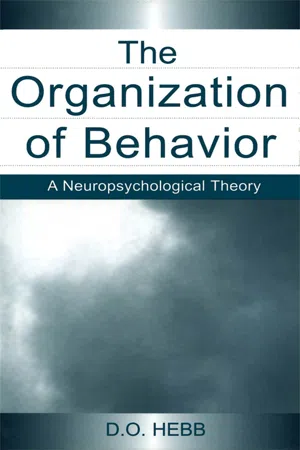
- 378 pages
- English
- ePUB (mobile friendly)
- Available on iOS & Android
About this book
Since its publication in 1949, D.O. Hebb's, The Organization of Behavior has been one of the most influential books in the fields of psychology and neuroscience. However, the original edition has been unavailable since 1966, ensuring that Hebb's comment that a classic normally means "cited but not read" is true in his case. This new edition rectifies a long-standing problem for behavioral neuroscientists--the inability to obtain one of the most cited publications in the field.
The Organization of Behavior played a significant part in stimulating the investigation of the neural foundations of behavior and continues to be inspiring because it provides a general framework for relating behavior to synaptic organization through the dynamics of neural networks.
D.O. Hebb was also the first to examine the mechanisms by which environment and experience can influence brain structure and function, and his ideas formed the basis for work on enriched environments as stimulants for behavioral development.
References to Hebb, the Hebbian cell assembly, the Hebb synapse, and the Hebb rule increase each year. These forceful ideas of 1949 are now applied in engineering, robotics, and computer science, as well as neurophysiology, neuroscience, and psychology--a tribute to Hebb's foresight in developing a foundational neuropsychological theory of the organization of behavior.
Frequently asked questions
- Essential is ideal for learners and professionals who enjoy exploring a wide range of subjects. Access the Essential Library with 800,000+ trusted titles and best-sellers across business, personal growth, and the humanities. Includes unlimited reading time and Standard Read Aloud voice.
- Complete: Perfect for advanced learners and researchers needing full, unrestricted access. Unlock 1.4M+ books across hundreds of subjects, including academic and specialized titles. The Complete Plan also includes advanced features like Premium Read Aloud and Research Assistant.
Please note we cannot support devices running on iOS 13 and Android 7 or earlier. Learn more about using the app.
Information
Table of contents
- Cover Page
- Title Page
- Copyright Page
- Foreword
- Preface
- Introduction
- 1. The Problem and the Line of Attack
- 2. Summation and Learning in Perception
- 3. Field Theory and Equipotentiality
- 4. The First Stage of Perception: Growth of the Assembly
- 5. Perception of a Complex: The Phase Sequence
- 6. Development of the Learning Capacity
- 7. Higher and Lower Processes Related to Learning
- 8. Problems of Motivation: Pain and Hunger
- 9. The Problem of Motivational Drift
- 10. Emotional Disturbances
- 11. The Growth and Decline of Intelligence
- Bibliography